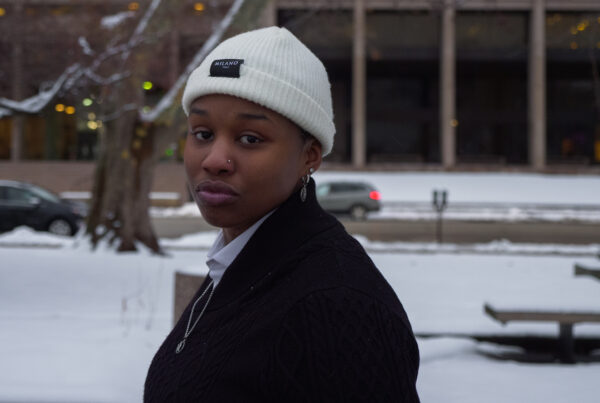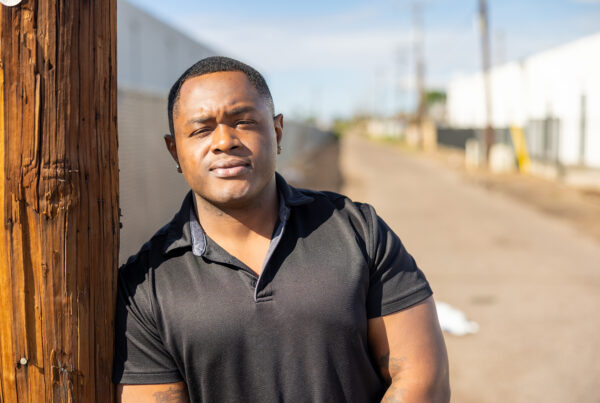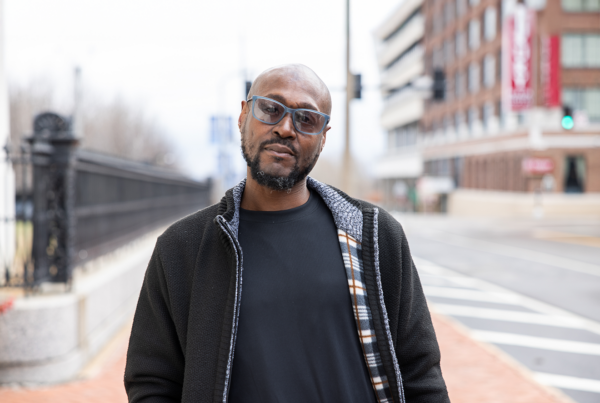Francis, 64, heard the men yell his name. He was one of around 25 other detainees housed in the blind and visually impaired section at Men’s Central Jail in downtown Los Angeles. Most had huddled around a table in the common area, singing oldies from musicians like The Bonnettes and Bee Gees.
C’mon, Francis, sit down and join us! We got a seat for you here.
Francis stumbled out of his cell. He hadn’t been given a mobility cane, nor any other type of device to help him get around the jail. Instead, he used the lyrics of music that once filled him with joy to help guide him to the other side of the room. The men asked Francis to sing. He chose Peaches and Herb’s “Close Your Eyes”:
Close your eyes (close your eyes), take a deep breath (ahhh!)
Open your heart (open your heart), and whisper
I love you, I love you
It was early summer 2021. Although still legally innocent, Francis had been incarcerated for nearly one month because he couldn’t afford to pay the bail amount the judge had set as a condition for his release before trial. More than a few times he’d bumped his head on the railing of the stairs, knocked his shin on the steel frame of his bed, and tripped over things.
“I spent most of my time in jail alone. What I did the most was pray. I kept praying and talking to God.”
“The only time the authorities helped me do anything was when I had to go to court or get to another part of the jail,” Francis recalled. “They put me in the wheelchair and rolled me around like that until I got to the next part. I spent most of my time in jail alone. What I did the most was pray. I kept praying and talking to God.”
Incarcerated individuals with physical disabilities often face unjust treatment.
The way the California and Los Angeles court systems and correctional facilities treated Francis is not uncommon. The Center for American Progress reports that “a lack of accessibility and a failure to provide needed accommodations are widespread throughout the nation’s courts.”
Yet, the number of incarcerated persons with physical or communication disabilities continues to grow. According to the Bureau of Justice Statistics, people behind bars in state and federal prisons are nearly three times as likely to report having a disability as the nonincarcerated population. Those in jails are more than four times as likely.

These individuals are routinely left behind bars without access to devices and technologies that they are dependent on in order to communicate or be mobile. This is despite it being a violation of federal antidiscrimination law, which requires jails and prisons to provide adequate resources and preparation to meet the needs of individuals in carceral environments.
Cash bail systems exacerbate this crisis. When incarcerated people with physical disabilities – such as those who are visually impaired or hard of hearing – cannot afford to pay money to the court in exchange for their release before trial, they are unable to advocate for themselves in their own defense. Prosecutors take advantage of people who are detained pretrial by pressuring them to take plea bargains and threatening them with lengthy sentences if they take their cases to trial. Those detained pretrial are also more likely to receive additional jail or prison time if they are sentenced, compared to similarly situated people who are able to pay bail and be released. It’s for these reasons that people detained pretrial are less likely to reach a fair outcome in their case.
For Francis, being locked in jail because he couldn’t afford bail made him feel like he was being punished for being poor. Unable to pay rent, he worried he would lose his apartment and become homeless. It would take three years before his case finally went to trial and a jury found him not guilty.

The harsh conditions of incarceration took their toll on Francis.
When Francis was first incarcerated, he didn’t think he could survive another month behind bars, let alone several years. He felt weak and unwell. Medical staff at the jail refused to give him pain medications for the throbbing headaches he was having on a near daily basis. These headaches were caused by bullet fragments that remained lodged in his head after he was shot by a stray bullet and went blind two decades ago.
Francis was determined to prove his innocence. But soon, he worried, there would be no other option but for him to take a plea bargain so that he could escape the harsh conditions of jail. Pleading guilty to something he did not do in order to regain freedom back seemed ironic. But he was strongly considering doing so if it ensured his health and prevented homelessness.
“I was going crazy staying there in jail.
“I was going crazy staying there in jail,” Francis said. “Any longer in jail, and prosecutors were telling me just to plead guilty and that I’ll get time served.”
As the days turned into weeks, Francis became more withdrawn. His expressive smile and quick witty jokes vanished. His appetite was gone. He spent most days alone in his cell, praying.
Noticing this, Francis’s fellow detainees tried to include him in as many activities as they could: They invited him to play dominoes and cards and listen to the TV. Most of the time, Francis refused. But on a few occasions, when he agreed, it was only because they asked him to sing.
Music has always played a huge role in Francis’s life, but even more so since he became blind.
Francis connected with fellow detainees through music.
Francis was born and raised in Pasadena, California. Growing up, he played the drums and enjoyed hip-hop and rap. He sang oldies and jazz music, too. As an adult, he taught himself how to play the piano. He also started to write his own rap music. The lyrics in his songs span a wide variety of themes: love, politics, race, and what it was like growing up in a rough neighborhood, to name a few. But each song he wrote held a deep and special meaning to him. Music is how he shares his worldviews with others, explains hardships he’s overcome, and describes his other life experiences. Sometimes Francis ventured over to a bus stop, set his small box stereo down, and sang different tunes for people waiting to catch their ride. On other occasions, he recorded music at the studio with friends.
Singing for fellow detainees brought back those memories of better days. At the jail, Francis would sit with the other men at the table and sing. Sometimes it would only be for five or ten minutes. But other times he sang for 45 minutes or one hour. Afterwards, they’d chat about life and socialize.
“That was the good part about my being in there, you know, they were really friendly with me,” Francis said. “The inmates in the county jail would actually help me get to the shower. And, you know, someone would clear it out for me, so I’ll be able to take my shower. When it came to the meal time, they said, ‘I’ll get it for you.’”
Francis appreciated their help. But he wished he had his mobility cane so he could get around the jail by himself. He’s always considered himself an independent person, but even more so since he became blind. “Some people assume when they learn I’m blind that I need to be taken care of, or that I get treated better,” Francis said. “It trips them out when they hear that I want to do things by myself. I clean. I cook. I take the bus to get around. I even jaywalk.”

Francis reclaimed his independence with The Bail Project’s help.
After spending a month behind bars, Francis learned through his public defender that in addition to paying his bail for free and being released from jail, The Bail Project would also offer him free court reminders and transportation assistance. No longer in shackles and back home in the comfort of his own house and bed, it wasn’t long until Francis’s smile returned to his face. His energy and mood was lifted the moment he left jail and he felt the sunshine on his skin and breathed in the crisp, cool air. He felt relieved to be back in a familiar environment where he was safe.
On a recent morning, Francis woke up and decided to play the piano and sing. He chose a song he wrote himself. It was about young love. Francis felt like celebrating. He felt alive. After waiting three long years, his case had recently been resolved. He was proud he proved his innocence. “Being able to do that for myself shows how I don’t have to depend on anyone,” Francis said. “It shows that I wasn’t taken advantage of.”
Thank you for reading. The Bail Project is a 501(c)(3) nonprofit organization that is only able to provide direct services and sustain systems change work through donations from people like you. If you found value in this article, please consider supporting our work today.











